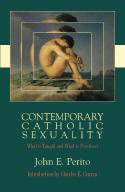Issue Date: April 9, 2004
Author contrasts church teaching with the experience of the faithful Reviewed by JAMES L. EMPEREUR For the person, Roman Catholic or not, who is curious to know why the Vatican’s position on many issues of sexual morality has had and is having such a mixed reception by the Catholic faithful, John Perito’s book is the one to read. Perito does not approach the topics of contemporary Catholic sexuality specifically as a moral theologian or ethicist but as a certified psychiatrist and psychotherapist who brings to his writing the experience of a career-long interest in the area of sexuality. I would consider his approach to sexuality to be a psycho-spiritual one. When he respectfully diverges from the Vatican’s position, he is simply following his methodological starting point. A change has taken place in theological thinking from physicalism to personalism, from an action-centered to a person-centered approach. Perito embraces the person-centered approach while the Vatican still holds on to the more traditional action-centered approach. In the matter of determining what is right or wrong, it is easy to see how Perito and the Vatican and those who embrace the Vatican’s approach would clash. The Vatican asks physical questions that require physical answers, for example, sexual actions between a couple (husband and wife) are moral as long as the male semen is deposited in the vagina through sexual intercourse. Perito is asking human questions that demand human answers. “Lovemaking should be free and mutual. … What is critical is a sense of lovemaking in which the interpersonal issues are attended to.” This person-centered approach as applied to marriage and contraception guides the other moral issues of the book such as masturbation and homosexuality. One can make the case that the majority of Catholics are more person-centered than action-centered in the various areas of their lives, for example, decisions about where to send their children to school, how to deal with aging parents and how to choose a health care professional. Being person-centered in large areas of their lives, it is natural they would be person-centered in the area of sexuality, perhaps especially so. This has affected the reception, or lack of it, of the Vatican’s positions on sexual morality. Perito writes that the most important chapter in his book is the one on sexuality and spirituality. It is through the lens of spirituality tinted with a psychological perspective that Perito takes up the issues of sexual fantasy, celibacy, marriage and the Roman Catholic priesthood, aging and pedophilia. Like many authors today, Perito defines spirituality in broad terms, so spirituality ranges from the casual contemplation of a sunrise to a full-blown tradition of ritual behavior, spatial practices, silence, meditation and contemplation. Specialists in spirituality are less willing to name experiences of the Grand Canyon as constituting spirituality. Such experiences may be spiritual, but spirituality names a way of life with its practices and procedures. To be faithful to Perito, when he discusses the spiritual dimension of topics such as aging or celibacy, it is his Christian spirituality that shines through. His real concern here is to unite the sexual and spiritual dimensions of the human person. “We need a spirituality that fits our sexuality and a sexuality that fits our spirituality.” The chapters are brief, and they contain many illustrative examples. The concerned religious person will find him/herself saying “amen” to many of the conclusions and pastoral suggestions. I can envision many committed Catholics nodding their heads in agreement when Perito speaks of sexual maturity. For him, sexual fantasy plays a significant role in coming to that maturity. He has a nuanced understanding of lust, which cannot be reduced to one line from the New Testament. In a summary statement, he notes, “The question arises as to how that maturity can be achieved if the first legitimate expression of sex is after one is married.” I can only imagine that Perito gives voice and tongue to the thoughts of Catholics as they reflect on how they are to live lives fully in the Catholic tradition. I find that his definition of intimacy is narrower than I would wish. For him, there might be closeness between a psychiatrist and a patient, but this is not intimacy. In his definition there seems to be little room for self-intimacy, the kind one experiences in prayer or while doing yoga or even sitting in front of one’s computer. Some of the most intimate moments can be experienced when one is alone. Perito makes a number of statements that bear further development. One that caught my attention seems obvious. “Perhaps this increasing percentage of homosexuals in the priesthood may prove to be one of the elements that will help to abolish the requirement of celibacy for ordination to the priesthood.” In other words, the Vatican, which remains unpersuaded by the need for more priests or the value of having married men in the priesthood, will lessen the celibacy requirement to avoid the fact and/or appearance that the priesthood is peopled by homosexuals. Perito’s closing challenge seems to me to be the only way to proceed to advance the process of psychosexual development in the church, namely, that there be a continual dialogue between psychologists and theologians so that our morality will be informed by what is mentally healthy and maturing. It is the way to insure that our humanity is both healthy and holy. Jesuit Fr. James L. Empereur is parochial vicar and liturgist at San Fernando Cathedral in San Antonio. He was formerly a professor of liturgy at the Jesuit School of Theology in Berkeley, Calif. National Catholic Reporter, April 9, 2004 |
